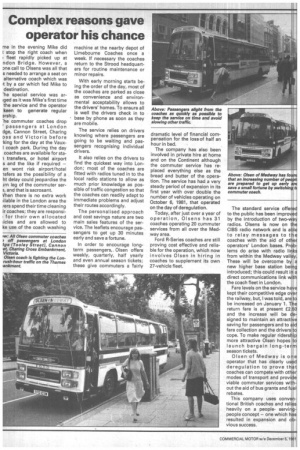Complex reasons gave operator his chance
Page 20

If you've noticed an error in this article please click here to report it so we can fix it.
me in the evening Mike did t stop the right coach when
fleet rapidly picked up at ndon Bridge. However, a Dne call to Olsens was all that s needed to arrange a seat on alternative coach which was ,t by a car which fed Mike to destination.
he special service was arged as it was Mike's first time the service and the operator keen to generate regular arship.
he commuter coaches drop ' passengers at London dge, Cannon Street, Charing oss and Victoria before .king for the day at the VauxI coach park. During the day coaches are available for sta transfers, or hotel airport s and the like if required — en wont risk airport/hotel isfers as the possibility of a ht delay could jeopardise the Jrn leg of the commuter ser3, and that is sacrosant.
Vhen there is no extra work ilable in the London area the ters spend their time cleaning ir coaches; they are responsi for their own allocated 'ides and are allowed to ke use of the coach washing machine at the nearby depot of Limebourne Coaches once a week. If necessary the coaches return to the Strood headquarters for routine maintenance or minor repairs.
With early morning starts being the order of the day, most of the coaches are parked as close as convenience and environmental acceptability allows to the drivers' homes. To ensure all is well the drivers check in to base by phone as soon as they are mobile.
The service relies on drivers knowing where passengers are going to be waiting and passengers recognising individual drivers.
It also relies on the drivers to find the quickest way into London; most of the coaches are fitted with radios tuned in to the local radio stations to allow as much prior knowledge as possible of traffic congestion so that the coaches can readily adapt to immediate problems and adjust their routes accordingly.
The personalised approach and cost savings nature are two main sales features of the service. The leaflets encourage passengers to get up 30 minutes early and save a fortune.
In order to encourage longterm passengers,. Olsen offers weekly, quarterly, half yearly and even annual season tickets; these give commuters a Tairly dramatic level of financial compensation for the loss of half an hour in bed.
The company has also been involved in private hire at home and on the Continent although the commuter service has replaced everything else as the bread and butter of the operation. The service has had a very steady period of expansion in its first year with over double the number of vehicles operating on October 6, 1981, that operated on the day of deregulation.
Today, after just over a year of operation, Olsens has 3 1 coaches operating 20 cummuter services from all over the Medway area.
Ford R-Series coaches are still proving cost effective and reliable for the operation, which now involves Olsen in hiring in coaches to supplement its own 27-vehicle fleet. The standard service offered to the public has been improved by the introduction of two-way radios. Olsens is now on the CIBS radio network and is able to relay messages to the coaches with the aid of other operators' London bases. Problems do arise with radio links from within the Medway valley. These will be overcome by a new higher base station being introduced; this could result in a direct communications link with the coach fleet in London.
Fare levels on the service have kept their competitive edge over the railway, but, I was told, are to be increased on January 1. The return fare is at present £2.50 and the increase will be designed to maintain an attractive saving for passengers and to aid fare collection and the drivers to cope. To make regular ridership more attractive Olsen hopes to launch bargain long-term season tickets.
Olsen of Medway is one operator that has clearly used deregulation to prove that coaches can compete with other modes of transport and provide viable commuter services without the aid of bus grants and fuel rebates.
This company uses conventional British coaches and relies heavily on a peopleservingpeople concept — one which has resulted in expansion and obvious success.


































































